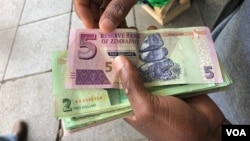MacDonald Dzirutwe
* Mnangagwa under pressure to deliver change
* Wants to unlock lending from G7 countries
* IMF criticises economic, political progress
By MacDonald Dzirutwe
HARARE, Sept 26 (Reuters) - The International Monetary Fund said on Thursday that Zimbabwe needed to intensify reform efforts and meaningfully improve transparency, as the government faces growing criticism over its commitment to delivering economic and political change.
The warning came the same day that the Financial Times reported that the IMF had privately warned Zimbabwe that state payouts to local company Sakunda Holdings were undermining trust in the economy.
President Emmerson Mnangagwa’s opponents say the government is reverting to the authoritarian tendencies seen under former leader Robert Mugabe, who died early this month, by clamping on dissent. They also criticise Mnangagwa for presiding over soaring prices and shortages of foreign currency and fuel that have sparked anger among a restive population.
Mnangagwa and senior officials say they are doing their best to lay the foundations for future growth and blame Western sanctions for hampering recovery and deterring investment.
“Policy actions are urgently needed to tackle the root causes of economic instability and enable private-sector led growth,” the IMF said in a statement, after visiting Harare this month to review progress on a staff-monitored programme.
The programme doesn’t involve IMF loans, but the Zimbabwean government hopes it can help unlock future lending from countries in the G7 group of world powers.
The IMF added: “The key challenge is to contain fiscal spending consistent with non-inflationary financing and tighten monetary policy to stabilise the exchange rate and start rebuilding confidence in the national currency.”
The FT report said payouts to Sakunda, a fuel company owned by an ally of Mnangagwa, were equivalent to the central bank printing money.
A source with knowledge of the Sakunda transactions told Reuters the IMF had raised a red flag over the central bank’s preferential treatment of $366 million of Treasury bills issued to Sakunda in January.
Zimbabwe, which adopted the U.S. dollar as legal tender in 2009, launched a transitional currency in February and converted all its domestic foreign-currency debt to local currency at a ratio of 1:1. But Sakunda’s bills remained denominated in U.S. dollars, the source added.
Sakunda then redeemed $330 million of the bills in July and was paid more than 3 billion Zimbabwe dollars by the central bank, according to the source.
Last week, the company used some of the money to buy dollars on the black market, devaluing the local currency by 23%, said the source and two currency traders. The central bank ordered banks to freeze the accounts of the company and three other businesses, according to a letter seen by Reuters.
A parliamentary audit committee is currently investigating Sakunda’s involvement in agriculture financing.
Calls and messages to Reserve Bank Governor John Mangudya’s mobile phone went unanswered on Thursday, while Sakunda chief operating officer Mberikwazvo Chitambo did not respond to emailed questions and phone messages.
George Guvamatanga, permanent secretary at the ministry of finance and economic development, said the FT report and the comments by the source were without merit. He said: “These reports circulating are unfounded and malicious.” (Additional reporting by Alexander Winning; Editing by Alison Williams and Andrea Ricci)




